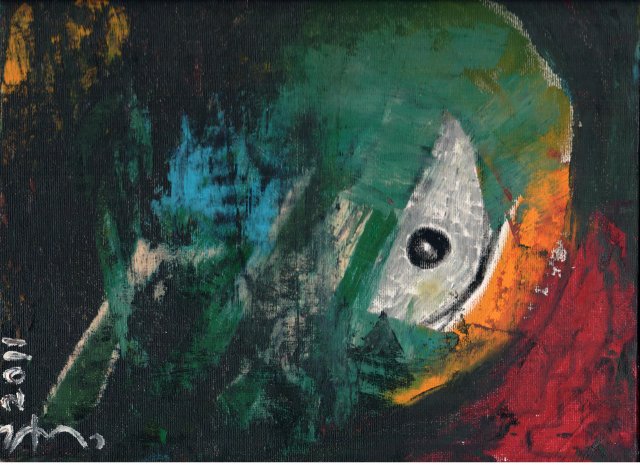Events
Yemen today
Saturday, April 22, from 3 pm to 6 pm

- Murad Subay, untitled, 2011
Roundtable moderated by Anahi Alviso-Marino (curator of the exhibtion One of Many Stories) with Nasser al-Aswadi (artist), Laurent Bonnefoy (political scientist), Franck Mermier (anthropologist) and Marine Poirier (political scientist).
This round-table discussion aims at addressing one of the elements that underpins the exhibition One of many stories: Yemen’s current war situation.
Since the end of 2014 and the beginning of 2015, the military offensive conducted by the Houthis against Abd Rabbu Mansour Hadi’s government has been intensifying in order to push back the transitional process that has been initiated under the latter’s presidency in 2012. In 2015, the resignation of both the President and the government precipitated the country in an unprecedented crisis. “Decisive Storm”; a military intervention led by Saudi Arabia with the support of the United Arab Emirates, Qatar, Bahrein, Kuwait, Egypt, Jordan, Morocco and Sudan was launched during the night from March 25 to March 26, 2015. Today, the bombings persist, the Yemeni historical heritage is being destroyed by military attacks, and the number of civil victims increases while corpses continue accumulating in some of the streets of the country. The ongoing bombings continue to diminish the prospect that the conflict would end rapidly. The speakers of this round-table discussion will bring to conversation elements that contextualize the ongoing bombings in Yemen. They will also contextualize, from their own area of expertise, a close-reading of some of the documents that are displayed in the exhibition.
Anahi Alviso-Marino is currently a FMSH/CEFAS postdoctoral fellow and an associated researcher at the CESSP/France and CRAPUL/Switzerland. She obtained her doctorate in Political Science at the University Paris 1-Sorbonne and the University of Lausanne, researching the political sociology of visual arts in Yemen. The Societé Academique Vaudoise in Switzerland awarded her dissertation, and it also received a special mention from the jury of the 2016 Dissertation Prize on the Middle East and Muslim Worlds (IISMM and GIS), France and an honorable mention from the 2017 Rhonda A. Saad Prize committee, United States. Her current projects focus on archival and ethnographic research in visual arts in Gulf countries such as Kuwait and Oman. Her publications include peer-reviewed articles, popular pieces, book chapters and curatorial projects.
Nasser Al Aswadi was born in October 4th, 1978 at al Hujr village, not far from Taiz, the third city of Yemen. He studied architecture in Taiz and then in Sanaa. Since 2008, Nasser has been moving between Yemen and France. For Nasser Al Aswadi, calligraphy is a means to express both feelings and thoughts without necessarily tying them to language. He resorts to Arabic letters, words and forms; to religious and musical sources. His work is inspired by the Arab Spring events, by daily realities, rural landscapes and architectures.
Laurent Bonnefoy is a Research Fellow at CNRS, at the CERI / Political Science lab. Specialist of politics and Arabian culture and Arabic language, he has been working on the Salafist movement and on the contemporary Arabic peninsula. He is the co-director of the ERC project “When authoritarianism fails in the Arab World (WAFAW).” He has been working at the French center for archeology and social sciences in Sanaa for four years, and at the French Institute of Middle-East for other two years. His publications mostly deal with Islamists movements and the political processes implemented in Yemen. He is the author of Salafism in Yemen. Transnationalism and Religious Identity (Hurst/Columbia University Press, 2011), and has co-directed Yémen. Le tournant révolutionnaire (Yemen. The revolutionary turn Karthala, 2012) and Jeunesses arabes. Du Maroc au Yémen : loisirs, cultures et politique (Arab youths. From Morocco to Yemen: leisure, culture and politics La Découverte, 2013). He just finished the writing of Yémen, par delà les marge (Yemen, beyond the margins), which is to be published by fall 2017, by Fayard.
Franck Mermier is anthropologist and director of research at CNRS, and member of the l’Institut Interdisciplinaire d’Anthropologie du Contemporain (EHESS-CNRS). He has been living in Yemen for about ten years and directed the Centre Français d’Etudes Yéménites in Sanaa (1991-1997). He published Le cheikh de la nuit. Sanaa, organisation des souks et société citadine (The Night Sheikh. Sanaa; the souk organization and the city society Actes Sud/Sindbad, 1997) and co-directed Le Yémen contemporain (Contemporary Yemen, Karthala, 1999) with Rémy Leveau and Udo Steinbach, and Yémen. Le tournant révolutionnaire (Yemen. The Revolutionary Turn, Karthala, 2012) with Laurent Bonnefoy and Marine Poirier. Franck Mermier also directed the department of contemporary studies at l’Institut Français du Proche-Orient of Beirut (2005-2009). A great part of his work deals with urban societies and cultural production in the Arab world. Among his publications we can mention Le livre et la ville. Beyrouth et l’édition arabe (The book and the city. Beirut and the Arabic edition. Actes Sud/Sindbad, 2005) and Récits de villes : d’Aden à Beyrouth (Stories of cities: From Aden to Beirut, Actes Sud/Sindbad, 2015). He coordinated Regards sur l’édition dans le monde arabe (Perspectives on the edition in the Arab world, Karthala, 2016) with Charif Majdalani. In May 2017 a collective book which will gather texts translated from Syrian and Yemeni authors will be published under the name of Syrie-Yémen, d’une guerre l’autre (Syria-Yemen, from one war to the other, Galaade).
Marine Poirier is a PhD in political science (CHERPA / IREMAN, Aix-en-Provence). Her thesis focused on the support to the authoritarian Yemeni regime (2008-2011) and its logics. She published several articles on political parties and mobilizations and on the revolutionary process. She codirected Yémen. Le tournant révolutionnaire (Yemen. The Revolutionary Turn ; Paris, Karthala/CEFAS, 2012) with Laurent Bonnefoy and Franck Mermier.
Partager